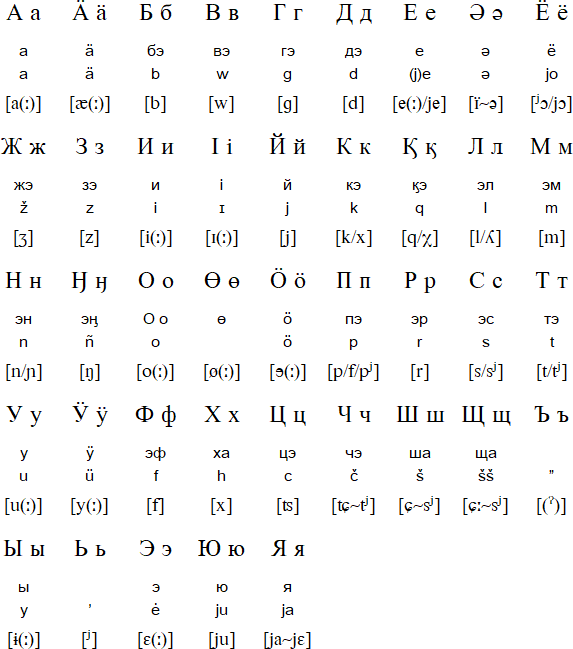Selkup is a Samoyedic language spoken by about 1,020 people along the Taz River and between the Ob and Yenisei rivers in Siberia in northern Russia. There are three main varieties of Selkup: Taz (Northern) dialect, Tym (Central) dialect, and Ket (Southern) dialect. The dialects form a continuum and differ significantly from one another to the extent that varieties are at one end of the continuum are not mutually intelligible with varieties at the other end.
The name Selkup comes from the Russian селькупский язык (selkupsky yazyk), which is a version of the main of the language in Taz: шӧльӄумыт әты (šöľqumyt әty) - "forest-man language". Other dialects use different names.
In the 19th century N.P. Grigorovski, a civil servant and explorer, devised a way of writing Selkup with the Cyrillic alphabet and published an alphabet primer. He based his alphabet on a southern dialect of Selkup. A religious teaching book was published in Selkup by the archbishop of Tomsk and Altai Makariy in 1900, although few Selkups were able to read it.
Another way of writing Selkup based on the Taz (northern) dialect was devised in the 1930s using the Latin alphabet. This was used in a few textbooks and other teaching materials and the language was used as a medium of instruction in some primary schools.
In 1937 another Cyrillic-based alphabet was devised for Selkup and the Latin one was abandoned. A number of textbooks were published in the new orthography, however in the mid-1950s Selkup was replaced by Russian as the medium of instruction in schools.
Another version of the Cyrillic alphabet for Selkup came into use in the 1980s, based on the Taz dialect, textbooks were published, and Selkup came to be used once again in some schools. Textbooks in other Selkup dialects have also been produced, as central and southern dialects differ significantly from northern dialects.
Today written Selkup is used mainly in schools and universities, and rarely elsewhere.

Download an alphabet chart for Selkup (Excel)
Information about Selkup pronunciation compiled by Wolfram Siegel
То момпа щӱн
өмтыса -най- әпөт.
Тэттын олоӄын илымпөтын.
То момпа ӄуп тӱла.
Щӱн өмтым
Щәкыса -най- понты
Сөрымпат.
То момпа щӱ -най- ӄутӄычымпа
Ӄум өмтым ила
Моӄына ӄэнпа.
То момпа щӱ -най- иляптымпа.
Моӄына -най- ӄэнпа.
Source: https://lyricstranslate.com/en/selkup-folk-шӱт-чөтый-чаптя-lyrics.html
Sample text provided by Jin Wei Hii
Information about the Selkup language and people
http://en.wikipedia.org/wiki/Selkup_language
http://www.eki.ee/books/redbook/selkups.shtml
http://www.ethnologue.com/language/sel/
http://lingsib.iea.ras.ru/en/languages/selkup.shtml
http://www.arcticphoto.co.uk/selkups.asp
Abaza, Abkhaz, Adyghe, Aghul, Akhvakh, Akkala Sámi, Aleut, Altay, Alyutor, Andi, Archi, Assyrian / Neo-Assyrian, Avar, Azeri, Bagvalal, Balkar, Bashkir, Belarusian, Bezhta, Bosnian, Botlikh, Budukh, Bulgarian, Buryat, Chamalal, Chechen, Chelkan, Chukchi, Chulym, Chuvash, Crimean Tatar, Dargwa, Daur, Dolgan, Dungan, Enets, Erzya, Even, Evenki, Gagauz, Godoberi, Hinukh, Hunzib, Ingush, Interslavic, Itelmen, Juhuri, Kabardian, Kaitag, Kalderash Romani, Kalmyk, Karaim, Karakalpak, Karata, Karelian, Kazakh, Ket, Khakas, Khanty, Khinalug, Khorasani Turkic, Khwarshi, Kildin Sámi, Kili, Komi, Koryak, Krymchak, Kryts, Kubachi, Kumandy, Kumyk, Kurdish, Kyrgyz, Lak, Lezgi, Lingua Franca Nova, Lithuanian, Ludic, Macedonian, Mansi, Mari, Moksha, Moldovan, Mongolian, Montenegrin, Nanai, Negidal, Nenets, Nganasan, Nivkh, Nogai, Old Church Slavonic, Oroch, Orok, Ossetian, Pontic Greek, Romanian, Rushani, Russian, Rusyn, Rutul, Selkup, Serbian, Shor, Shughni, Siberian Tatar, Sirenik, Slovio, Soyot, Tabassaran, Tajik, Talysh, Tat, Tatar, Teleut, Ter Sámi, Tindi, Tofa, Tsakhur, Tsez, Turkmen, Tuvan, Ubykh, Udege, Udi, Udmurt, Ukrainian, Ulch, Urum, Uyghur, Uzbek, Veps, Votic, Wakhi, West Polesian, Xibe, Yaghnobi, Yakut, Yazghulami, Yukaghir (Northern / Tundra), Yukaghir (Southern / Kolyma), Yupik (Central Siberian)
Languages written with the Latin alphabet
Page last modified: 19.03.24
[top]
You can support this site by Buying Me A Coffee, and if you like what you see on this page, you can use the buttons below to share it with people you know.

If you like this site and find it useful, you can support it by making a donation via PayPal or Patreon, or by contributing in other ways. Omniglot is how I make my living.
Note: all links on this site to Amazon.com, Amazon.co.uk
and Amazon.fr
are affiliate links. This means I earn a commission if you click on any of them and buy something. So by clicking on these links you can help to support this site.
[top]